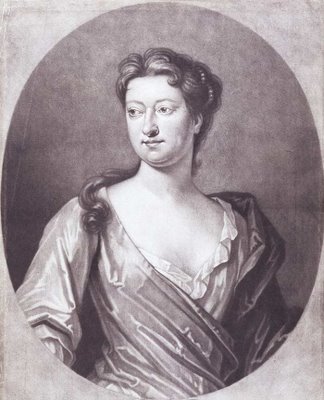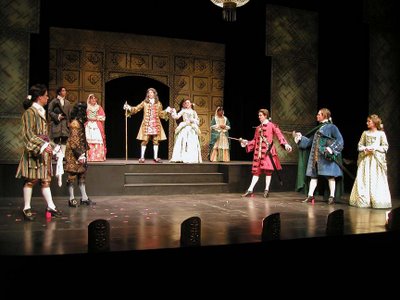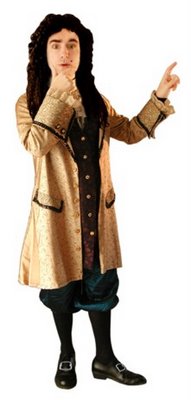The Modern Appeal of Susanna Centlivre’s "The Busybody"
 Two young women of marriageable age.
Two young women of marriageable age.Two young men, interested in these two young women.
Two parents determined to keep the young men well away from the young women.
Two servants, full of cunning plans.
And one busybody.
~ ~ ~ ~ ~ ~
I always find it interesting (and often cringeworthy) to see what kind of taglines are given to modern adaptations and republications of literature… for instance, I once saw a horrible play version of Pride and Prejudice starring B-list celebrities that reduced the story to a “sparkling battle of the sexes.” Another example: Andrea has a copy of an unfortunate new chick-lit edition of Persuasion with the tagline “You never forget your first love”... oh dear.
Looking online for material on Susanna Centlivre’s The Busybody (1709), I found a variety of modern productions with more or less the same kind of tagline/blurb.
Fordham University’s upcoming production in November-December 2006 sums up the play as follows: “Featuring audacious beauties and the beaux who desire them, Centlivre's invention of the geriatric guardians who strive to keep the lovers apart remains a hilarious, cautionary tale for parents who cross their children in love. Quick-thinking servants, and Sir Marplot, the slow-thinking busybody who can't help gumming up the works, drive the breakneck action to a fevered pitch.”
The University of Kentucky’s version in April 2006 (below) called the play “a vivacious comedy” with “intriguing male characters, charming and intelligent young heroines, sparkling wit, a bustling plot, and delightful gaiety.”

The Villanova Players' adaptation in Brisbane,
 Australia, in July 2003 called it a “wonderful romp” and a “witty, romantic, and strong play.” (This link is fun because it refers back to a 1796 production of The Busybody in the penal colony of Sydney Cove for an audience of free settlers, officers, officials, and their wives, who would probably have seen the play back in the old country. Apparently the convicts' acting was of "high quality" and the theatre owner--who had been transported to Australia for housebreaking and highway robbery--found himself quite wealthy! An English newspaper reported with astonishment that “His sentence has been expired two or three years, but he does not wish to return at present, being in a fair way of making a rapid fortune”!)
Australia, in July 2003 called it a “wonderful romp” and a “witty, romantic, and strong play.” (This link is fun because it refers back to a 1796 production of The Busybody in the penal colony of Sydney Cove for an audience of free settlers, officers, officials, and their wives, who would probably have seen the play back in the old country. Apparently the convicts' acting was of "high quality" and the theatre owner--who had been transported to Australia for housebreaking and highway robbery--found himself quite wealthy! An English newspaper reported with astonishment that “His sentence has been expired two or three years, but he does not wish to return at present, being in a fair way of making a rapid fortune”!)Back to my meandering and maybe not very profound point... Thinking about taglines, I think sometimes they are used to try and smooth out or gloss over elements of works that are less than palatable to a modern sensibility, thereby playing up the more acceptable bits. Aphra Behn's "The Rover," for instance, is called a "rollicking Restoration comedy" a lot, but I know several people in our class who find aspects of the play, i.e. its undertones of rape, a bit too unfunny to be called "rollicking."
Centlivre, maybe more than any of the playwrights we've encountered thus far, seems to need little "smoothing out" to make her attractive to modern theatregoers. In his article "Marriage and Marrying in Susanna Centlivre's Plays," Richard C. Frushell writes:
“Restoration stereotypes were still discernable along with a changed comedy. Her plays use Restoration comedic traditions in plot and theme, intermixing them with that strain of the ‘new’ comedy today called risible and humane.” (Frushell 16)
As Frushell says, "the cynicism of earlier Restoration drama is gone" (17), keeping up with the vogue of what he calls “laughing, affable comedy” (16). This lack of cynicism, coupled with the fact that Centlivre is "realistic, clear-eyed, unsentimental" (26), is what makes her, I think, not just of intellectual interest to feminist academics, but enjoyable to a general audience.
Lastly, I found this observation of Frushell's really interesting: "Centlivre's plays appealed to audiences already leaning toward opera, farce, and that new fiction just on the horizon, the novel" (19). Reading Centlivre has helped me further understand the transitional period between the Restoration era and the so-called Augustan age.

4 Comments:
I think I would boil this play down to the following:
"Beautiful girls and the guardians who love -- or even love -- them."
Alternately:
"Two guys, two girls, and a fop."
How about:
"Can't buy her love!"
(Also, Kari, I love your blog every week for the pictures, I find they add a real layer to the plays every week. :) )
How I hate the word "romp"! And "rollicking" and . . . well, there are probably too many to count. I think you are absolutely right, Brenna: these sorts of taglines say nothing so much as: "Don't worry, nothing new or disconcerting here! You may proceed in safety."
(But writing them is fun. How about, "Canny girls get the young bucks and the money too.")
How do you find these pictures/websites? I obviously need to go to remedial Googling school.
I have no clever tagline *hides face in shame*
HA HA! I like that one. I can just hear the "movie voice man" saying it.
Post a Comment
<< Home